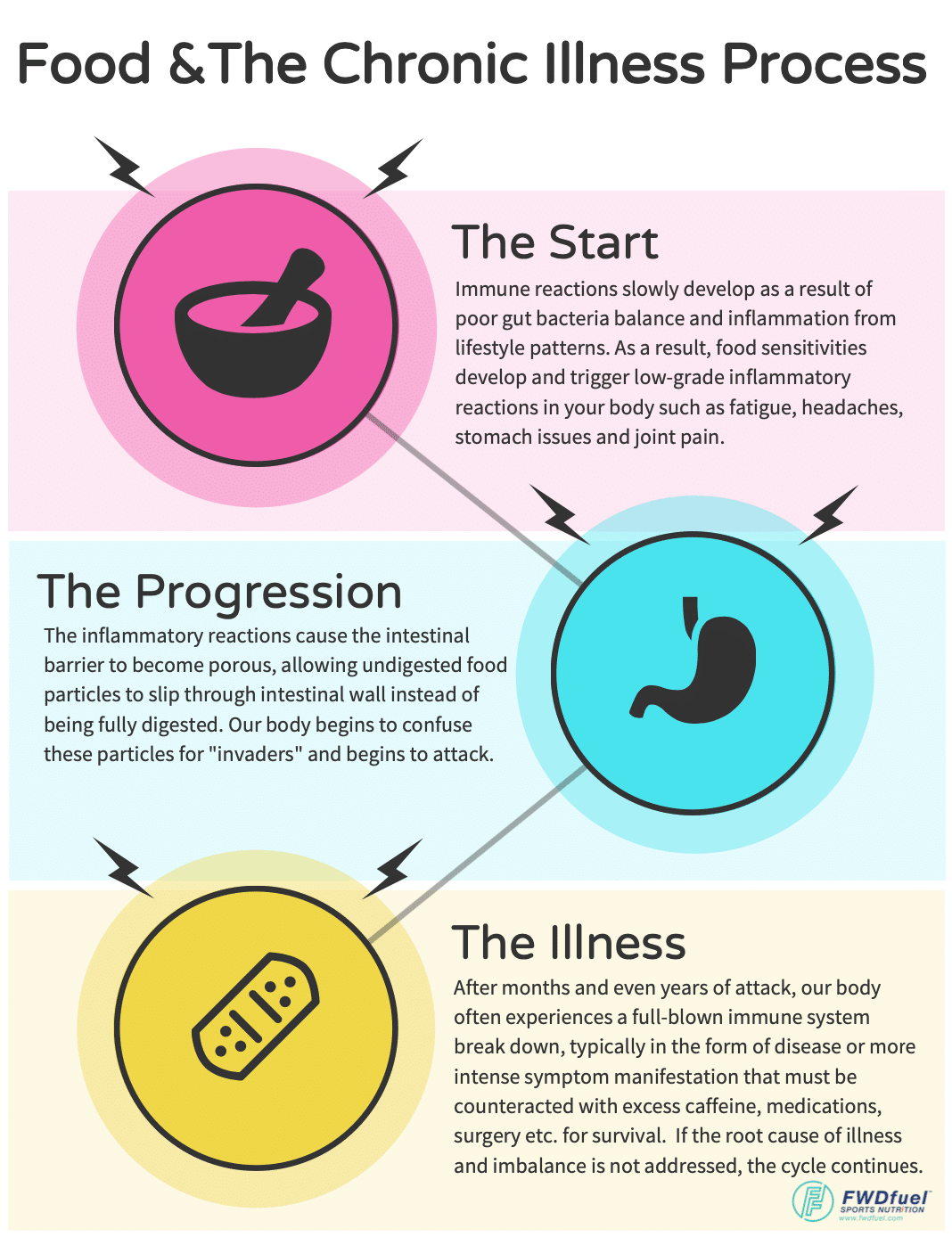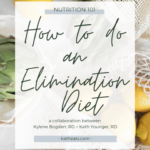In this guest post Kylene Bogden, performance dietitian for the Cleveland Cavaliers and co-founder of FWDfuel Sports Nutrition, teaches how an elimination diet can be used to help fix gut issues and chronic fatigue.
Hi guys, Kath here! You guys know I believe that I don’t believe in diets, and that all food groups can be enjoyed as part of a diverse diet (I’m looking at you gluten and dairy!) That said, every body is different. And only you know how you feel. And if you just have a gut feeling (pun intended!) that something you are eating might be throwing off your wellness, how do you go about figuring out what it is so you can continue to enjoy all the other foods you love? Registered Dietitian Kylene Bogden specializes in functional nutrition and elimination diets and is here today to share a science-based guide on how to troubleshoot your diet. Take it away Kylene!
Please keep in mind that an elimination diet is not suitable for everyone. When attempting an elimination diet, it is highly recommended that you consult with your registered dietitian. Those with a past medical history of an eating disorder or disordered eating may not be an appropriate candidate.

Do you ever wake up and think “Man, there is no way I can get through today without some form of caffeinated beverage!” (or, allergy meds, reflux meds, an abundance of candy- you fill in the blank…)
How about “My joints have felt so stiff and creaky for a while now. Aren’t I a little too young for this nonsense?!
And then there’s, “ Ughh! I should not have acne as an adult.” Or “I swear these foods never made me bloat or sent me to the bathroom before!!!”
Guess what? I have some exciting news…
Contrary to popular belief (and what your doctor might have told you), this is not “aging!” Nor is it being a “busy mom” or “marathon runner balancing a stressful job.”
Annoying symptoms are actually a result of an overburdened immune system. Stay tuned because in this post I will be discussing how to use an elimination diet as a way to reverse fatigue and chronic health conditions!
Your Immune System in a Nutshell
OK, I promise not to dive too deeply into the science here, BUT, there are four key points I want you to understand regarding the complexity of the human immune system.
- Approximately 77% of our immune system resides in our gut! How crazy is that? In other words, everything we eat comes in contact with this powerful system. It’s no surprise then that junk food makes us feel so poorly and real food can literally save our lives. (Kath Younger= The Real Food Original MVP!)
- There are trillions of bacteria in our gut. In fact, the number of bacteria in our gut alone is exponentially MORE than the bacteria found within the rest of our entire body. Hence why it’s so important to have our gut bacteria “happy” and in balance.This bacteria is essentially the control center for our bodies. These little guys help us digest our food, produce vitamins, and protect us from outside danger. When our gut bugs are no longer balanced and living symbiotically, we may start to notice that suddenly we can no longer tolerate foods, we once ate daily. Next comes annoying symptoms like fatigue, skin rashes, sinus issues, joint pain, headaches and eventually, if left unaddressed, we may come face to face with an autoimmune diagnosis such as Hashimoto’s Thyroiditis, Celiac Disease, or Multiple Sclerosis.
- The immune system is like a bucket. We start to experience the nagging symptoms mentioned above when the bucket “overflows”. What causes the overflow? Things like stress, overtraining for a sport, lack of sleep, a crummy diet, and medications such as reflux medications, NSAIDS and antibiotics. Therefore, removing inflammatory foods can help unload the bucket if you will.
- Your genetics do NOT dictate your future! Sure, you may carry certain genes related to cancer or autoimmune conditions, but it does not mean that is your destiny. And yes, even if your mother, sister, and grandmother developed a certain condition, it does not mean that you will develop the condition as well.
When I started my career as a dietitian, I was taught that your genes are your genes and you will “just have to live with it.”
But now we know that lifestyle (mainly diet) can silence our “bad” genes or trigger and turn on those genes.
While there are no guarantees in life, eating in a way that silences funky genes is probably worth a shot. So, let’s get rolling!
An Elimination Diet Might Save Your Life
Alright, so what if I told you that there is a good chance that modifying your diet could reverse or at least significantly decrease your chronic symptoms? What if I also told you there is a chance that if an elimination diet is implemented properly, you may be able to completely avoid certain medications, testing, procedures, and surgeries in the future?
By the way, for what it’s worth, 10 years ago, I was totally the dietitian who made fun of all the “kook science” centered on removing foods from someone’s diet.
Fast forward to my years working at the Cleveland Clinic Center for Functional Medicine and my perspective completely changed.
It was actually part of our initial protocol to walk patients through an elimination diet, no matter their condition. I was extremely hesitant at first but, lo and behold, men and women who had suffered their entire lives from issues like fatigue, hives, migraines, bowel disease, and joint pain were suddenly seeing symptoms completely reverse for the first time. Many of these patients were told they just had to “deal with it” because “nothing can be done.” It was no surprise that our waitlist was ~3,000 patients for over a year straight!
This was undoubtedly the most rewarding experience of my career and that is why I’m excited to teach you the basics of an elimination diet today.
Elimination Diet Basics
What exactly is an elimination diet you ask? Well, put simply, it’s the removal and the reintroduction challenge of a certain food or food groups for a specific period of time.
Typically the shortest amount of time you would remove a food is for 3 weeks and for those who have not felt well for quite some time, we might extend the elimination period to 12 weeks.
In a dream situation, you would be working with an experienced dietitian who seeks to learn more about your symptoms, health history, family medical history, diet, and environment. After this assessment, your dietitian would help you decide which foods may be best to remove. If you are not working with a licensed professional, it is best to keep a food AND symptom journal for two weeks to see if you can track any patterns. The goal is to draw clues to guide your removal.
Lastly, if you take this approach and you struggle to find any correlations, I would suggest that you remove the most commonly consumed allergens such as wheat, egg, dairy, corn, soy, and peanuts. When your body is chronically inflamed, the immune system often attacks what it sees most.

Tips for Success When Removing Commonly Eaten Foods
1. Plan Ahead
It is not humanly possible to succeed when removing commonly consumed foods if you do not research some of the best elimination diet recipes in advance. This means you must plan ahead, shop ahead and cook ahead!! This is especially critical if you are:
- A picky eater or
- Live with individuals who eat differently than you
Plus, planning ahead is the only way to ensure that this is a simple, and cost-effective experience. Recipes can contain 2-5 ingredients if that is your style, like these sweet potato sliders!!
Most importantly, planning ahead ensures that your daily intake is balanced. Just because you have removed a few staple foods does not mean you should be living off lint and ice cubes each day. In fact, this defeats the entire purpose. If you are not maintaining proper macronutrient balance and or you are not hydrating properly during this process, the end result will not be what you had anticipated.

2. Rank Your Symptoms
I always have my clients rank their symptoms before and after implementing an elimination protocol. I usually administer the questionnaire that I created but you can actually develop your own version within minutes.
Create a scale of 0-10 in your head. On a sheet of paper, write down which symptoms are bugging you the most to the least. For example, daily migraines would be a 10 but joint stiffness a few times a week might be a 5. Sinus congestion once a week might be a 2. Add these numbers up and total your score. Do this again the day before you end the elimination diet.
3. Reintroduce Properly
After having walked thousands of individuals through an elimination protocol, there is one thing I can say for certain. If you do not reintroduce foods properly towards the end, it almost defeats the entire purpose of the food removal in the first place!
When it comes time to reintroduce, choose ONE new food at a time in its NAKED form. For example, if you removed dairy, do not reintroduce the ice cream with 7+ ingredients. Instead, start with a glass of milk as it does not contain any other ingredients.
Please also note that it can take up to 3-4 days for you to react to a certain food. This means, if you eat something on Monday, you may not feel the aftermath until Wednesday. This is why I strongly recommend introducing one new food every 4 days.
Lastly, be sure to document the reintroduction process. What went well? What was a disaster? This will be your guiding light when it comes to the next steps and long term success.
Always Remember, Food is Medicine
It is incredibly important to understand that we are using food as medicine during an elimination diet protocol. The process is no different than taking a medication for a few weeks. If you have a past medical history of an eating disorder or disordered eating, it is best to work closely with your healthcare team as an elimination diet may not be appropriate.
Please note that a severely restricted elimination protocol is NOT meant to be implemented for the rest of your life. If you find that 6-12 weeks pass and you do not feel well upon the majority of food reintroduction, then that means we have not gotten to the root of your health issues. The root issue(s) must be addressed and the gut must be rebalanced for the body to successfully welcome back a wide array of foods!
And there you have it my friends, the 411 on elimination diets. If you have any concerns about your current state of health, please whip out that food journal and start taking notes today. You just might surprise yourself with the correlations that you make!
Do you have questions about an elimination diet? I’d love to connect with you. Please message me on Facebook or Instagram @fwdfuel!





Shana says
Can you share some of the peer reviewed articles that support these claims? I know there is some medical literature about elimination diets, but I do have some concern that for much of the population, this is a prescription for disordered eating when not monitored by a physician and an RD. Even under medical care, this could trigger ongoing issues with food completely unrelated to the symptoms of (vague) fatigue and intestinal disorders.
Kath Younger says
If anyone has previous food issues or a propensity towards disordered eating, I would absolutely recommend doing an elimination diet with an RD or MD. I’ll let Kylene share any research she used in her post.
Kylene says
Shana, you are absolutely correct. As medical professionals, we must screen for eating disorders AND even disordered eating before even thinking about implementing an elimination diet. But most importantly, the licensed professional must be trained in elimination diets before just throwing this onto a patient.
Yes, I will send you the entire list of references.
Kylene says
Shana,
Thank you for taking the time to comment. You are absolutely correct! Elimination diets are rarely ever appropriate for an eating disorder patient and in fact, even disordered eating. And yes, if not implemented correctly, they can definitely send someone down the disordered eating path. I actually have a research article in my references regarding the topic. Feel free to message me directly and I can also send you the references.
Although what is incredibly interesting is that I am seeing more and more patients who were diagnosed with an eating disorder when in all actuality, the root issue was that they were experiencing such a severe gastrointestinal imbalance, they were unable to tolerate an extremely wide variety of food. Thus, resulting in intense food fear. Once we began to address the gut issues, their diet expanded.
Sarah says
I don’t know, there are some big claims here. I know that diet is important, and I know that intestinal bacteria play an important role in health, but to say that an elimination diet could be “life saving” is extreme. I would also like to see sources sited that support these claims.
Kylene says
Sarah,
Great thoughts. Thank you for sharing.
I realize each patient’s view on quality of life can be very different but when I have women who are unable to leave their home to attend a family gathering and/or they are no longer able to drive a car, work etc. due to such severe migraines, joint pain- you name it- it can be life-altering when a few diet changes allows them to function in society again. This feeling of hopelessness is especially compounded when depression and anxiety eventually becomes a part of the equation. I do not take this lightly. So yes, it is life-saving for many that we see in our practice. References are being posted as we speak.
Lindsey says
This is SO helpful! I’ve struggled with reintroducing dairy after I cut it out while nursing our baby with a dairy allergy for 12 months. I may try eliminating it again to see if that’s truly what’s still bugging me.
Kylene says
Thanks for sharing, Lindsey! Yes, great plan. And, if it doesn’t go as successfully as planned, sometimes all it takes is a little more effort in the sleep, stress, exercise, and gut health department for you to be able to reintroduce that particular food again!
Charmaine Ng | Architecture & Lifestyle Blog says
Thanks for all the tips! So helpful 🙂
Charmaine Ng | Architecture & Lifestyle Blog
http://charmainenyw.com
Mollie says
I’ve heard in the past that an elimination diet can also cause an intolerance that didn’t exist prior to the elimination (due to prolonged lack of exposure)—is there any merit to that? Similar to how Israel has one of the lowest rates of peanut allergues in the world, and they also tend to introduce a peanut snack to their babies really early in life.
Also is there any credence to the hygiene hypothesis, where our immune systems turn inward and attack us when it doesn’t have anything in our external environment to fight? Personal anecdote, but my sister had eczema, asthma and allergies all her life here in the US, but she moved to a tea estate in South India and it all cleared up within the year
Allie Stewart says
I’m curious about the question re: elimination diets potentially causing intolerances, too! I was considering cutting out dairy, but really don’t want to make myself intolerant if I’m not 🙂
Kylene says
Hi Mollie!
Excellent thoughts and questions!
If all is in order— gut health, sleep, stress, etc. AND there is not a genetic component involved that may be preventing the individual from enjoying that food in the first place, the patient can successfully reintroduce that food without feeling poorly. Typically if the reintroduction does not go well, we have more work to do.
Your sister’s story is amazing and its also the perfect example of what I am trying to convey in this article. I have seen hundreds and hundreds of patients exactly like your sister. Our external environment can contribute greatly to that “immune bucket” and when our body can no longer take the amount that it is being exposed to, it will often attack us and our food. When we are no longer exposed to the threat, our body can “relax” so to speak and symptoms typically clear. Also, generally speaking, our food quality in the US does not tend to be as great compared to other countries overseas.
Ileana says
I’m a registered dietitian. Yesterday I watched a fabulous webinar from Kate Scarlata, a registered dietitian who’s a leader in the field for helping people with IBS and other functional gut disorders. The webinar discussed the low FODMAP diet which is a form of elimination diet for people who meet specific criteria (diagnosed with IBS or IBD or celiac with concurrent IBS symptoms) that is evidenced based to show benefits for those symptoms.
In that webinar, she stated cleary and explicitly that elimination diets are completely inappropriate for anyone with any history of disordered eating.
I concur with her opinion.
She also stated that any reactions to ingredients in food manifest in 20 minutes to 6 hours. How on earth would you know what food is affecting you if that time frame could go out for four days?
It’s very disheartening to me when other RDs follow the language of non-clinicians in discussing “leaky gut”, “adrenal fatigue”, and other vague buzzwords that are designed to make people afraid of food. A big part of learning about nutrition for me was recognizing that nutrition plays an enormous role in prevention and management of disease, but it isn’t everything. If one of my patients believes that food is the cause and solution to every problem in their life that’s a red flag that causes me to want to screen them for disordered eating and connect them with a behavioral health professional as appropriate.
I also would not encourage a patient to do any kind of elimination diet without guidance from a registered dietitian. The goal of an evidence-based elimination diet is to eventually introduce as many foods as possible, since we know dietary variety is good for variety of gut microbiota as well as simply being able to enjoy more foods and not be limited in what restaurants/cuisines you are able to enjoy. And, while an elimination diet is taking place, an RD can help someone make sure they are not missing out on any food groups/nutrients during the period their diet is more restricted.
Kylene says
Thank you for such a thoughtful response Ileana.
Kate has great information to share and in fact many of her resources are cited on our blog.
You are definitely correct in saying that we need to do our homework and not implement such a protocol with an ED patient. (There is an article on this in my references.) However, at the same token, as RDs we are doing a massive disservice to the patient by not digging deeper into their health situation. I am witnessing more and more circumstances where the patient has been incorrectly diagnosed with an eating disorder when the root issue was the fact that their gastrointestinal health was so poor, they were unable to tolerate 30+ foods, thus resulting in intense food fear. This is a very real issue that is being ignored left and right. The long term manifestations are unsettling.
Adrenal fatigue is not a proper or real term. Leaky gut is a term used to help the public better understand the medical term of intestinal permeability which is very much supported by research. Just because we were not presented with the evidence or research in school, does not mean it does not exist. There is an entire board certification on functional nutrition for RDs. At the end of the day, we have to constantly challenge ourselves to evolve as RDs and we must always put the patient first.
Jenni says
I agree with Kylene here.
Also, to Ilena, your response is EXACTLY why I have not wanted to work with an RD in the past and have had negative experiences: because it’s always the same story to eat a variety of foods, follow the food pyramid and not be limited in what you eat. That might work for a lot of people but a lot of other people are struggling with day-to-day food choices and just sending them to a behavioural therapist and telling them to drink milk/whatever does NOT solve the problem – it in fact can intensity it and make the person even more anxious and fearful. I think Kylene’s approach at the very least shows compassion and understanding to any individual who, believe it or not is in discomfort and not sure what to do and needs someone to believe in them. It may even show a person it is “safe” and healthy to eat certain foods they were avoiding out of fear once they are re-introduced And the client is given mindfulness/relaxation/stress-handling techniques. It could also help with timing: I had an RD tell me to have greek yogurt as an afternoon snack when I run after work AND take a gel about 45 mins into a run- when I was only running for an hour!: this is NOT good on my own stomach as a pre-run snack and not necessary at all to take during.
Kylene says
Jenni,
Thank you for such a thoughtful and insightful response. Your words are spot on and beautifully said.
I understand exactly where you are coming from and I want you to know that you are not alone. I am working around the clock to make sure that women such as yourself are being heard and properly cared for.
ifnacademy.com is a great place to find a functionally trained dietitian near you. Please do not hesitate to contact me directly if you need further assistance.
Take care!
T says
Thank you for this post. I agree with the elimination diet and disagree that it would promote any type of eating disorder. You can’t still eat plenty of nourishing foods and I’ve seen first hand how it can help you feel great and overcome illness that is brought on by inflammatory foods. Every one is different and figuring out which foods may cause an inflammatory response can be hard but well worth the effort.
Kylene says
Thank you for your thoughts, T! I agree. When there is not a genetic or environmental propensity for an ED, the end results are incredible!! I’ve also had patients come to me who were diagnosed with an ED when in fact, that was not the issue and the elimination diet is actually what helped them reverse their restricted eating patterns!!
Katie says
Such a great post! I’ve been dealing with an illness since January. In EArly May, I met with a functional nutritionist and I’m slowly starting to feel better. I considered myself a mainly healthy eater, but have kearned so much from her in the past month. While my doctors just said food doesn’t make a difference. Hopeful this helps me cure this issue.
Kylene says
This is so great to hear, Katie!! Keep up the outstanding work and you will see progress. Food has everything to do with disease and overall health! Kath and I are proud of you.
Beth Lawrence says
Very interesting. I also am an RD and find that approaches to health and nutrition have changed over my career. One aspect that drew me into the field of nutrition was that we’re always learning more, and evidence develops over time. For example, we used to recommend limiting eggs due to their cholesterol content, but now we’ve learned that dietary cholesterol doesn’t impact serum cholesterol as much as we once thought. Like Kylene, I was very skeptical in an environment I worked in involving a weight(fat) loss program in an endocrinology office. I’ve learned so much about how hormones, genetics and other chronic diseases, plus mental health play a role in weight management. It’s not as simple as calories in, calories out. Great article and I am keeping an open mind about functional nutrition. Also, GO CAVS!!!! and OH…..IO!
Kylene says
Thanks for your thoughts, Beth!! Way to challenge yourself and stay ahead of the curve. We must constantly evolve.. I think you are learning like me that “normal” does not always mean healthy!!
This is truly the only way we as RDs are going to continue to be seen as the true nutrition experts.
Erin says
This post was very helpful! Thank you for sharing!
Sarah says
I really appreciate this post. A few years ago, I was going through some extreme stomach issues. They caused a lot of anxiety because I never knew what my body would do. I didn’t trust myself to be away from a bathroom for more than 15-20 minutes. For example, I would stress about being able to “make it” through a 30 minute meeting at work; I would have to stop to use the bathroom on an hour car ride (in addition to going before I left and as soon as I got to my destination); I started avoiding social events where I knew I wouldn’t have access to bathrooms for more than 30 minutes. The anxiety (almost more than the stomach issues) was affecting all aspects of life and health. When my doctor suggested an elimination diet, I honestly didn’t think it would work. I wasn’t eating anything in the extreme, and I had tried to track my eating and determine what was affecting my stomach on my own with no solutions. At that point, I was willing to try anything. I started eliminating dairy, and in less than a week, I saw significant changes in how my stomach felt. I didn’t continue eliminating anything else because dairy was certainly the thing that was causing the stomach issues. It took a little longer to manage the anxiety, but I eventually got there. I’ve been dairy free (mostly) for several years, and I don’t know how else I could have detected the issue without the elimination diet. Looking back, I suffered with stomach issues and the anxiety that came with it for almost a year, and it took less than a month to figure out the cause. I wish I had tried the elimination diet sooner.
Kylene says
Sarah,
Thank you so much for sharing your powerful story. This is awesome news!! Way to take control of your health.
You are certainly not alone in this journey. I see women just like you with a similar story in my practice each week. It’s funny sometimes how the simplest tweaks can make the biggest difference in our overall health.
Keep fighting the good fight my friend!
Kylie Baker says
Wow, this article is incredible!! Finally, a progressive dietitian who understands how to properly piece together the research with experiential patient data. Food is medicine and plays a role at every root. I am embarrassed for some of the others who have negatively commeted. THANK YOU KATH!!!!
Kylene says
Kylie,
Thank you for your comment and for taking the time to read this article. I am glad you found it to be helpful!
Kathy Kimbrough says
As a dietitian specializing in eating disorders I’d like to chime in to express concern that the original post doesn’t address the contraindications for those with eating disorders and disordered eating. In my work I often see the flip side of what’s been stated in the comments by the author about eating disorders being misdiagnosed and an elimination diet helping them- I often see people with an undiagnosed eating disorder who have tried multiple elimination diets. The criteria used to diagnose an eating disorder in the DSM-5 are very specific and difficult to have a misdiagnosis situation. I feel to state otherwise is misleading and quite frankly dangerous. I believe it would be responsible to update this post with information on eating disorders and elimination diets.
Kylene says
Kathy,
Thank you for your comment.
Your insight is very valuable and your concern is something I address in each of my formal presentations on elimination diets. At the end of the day, we should all strive to be better and help educate our colleagues who may not have our same specialty and experience. The misdiagnosis of EDs and or neglect of DSM-5 criteria needs to improve. The functional practitioners who are not properly trained and are “winging” elimination diets without truly getting to know the patient needs to stop.
I would like to add that in addition to elimination diets not being implemented correctly, the improper testing and interpretation of food sensitivities is also fueling the eating disorder fire. Again, proper training and interpretation is critical.
I would be happy to update the post per your request.
Albertina Geller says
I really enjoyed reading this post! I was thinking of starting an elimination diet journey from the past few months. I will definitely re-read your post and consult my dietitian to help with elimination diet :).
bionaze says
My sister is having trouble losing weight and control her diet. I bookmarked your blog and will show this to her when she gets home. Thank you very much for sharing your insights!
Kylene says
Thank you for taking the time to read! Best of luck to your sister!